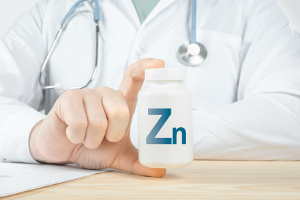Eczema and other skin disorders may be caused by zinc deficiency
 Over the past decades, it has been common practice to use zinc in creams and salves for treating various skin disorders. Zinc has wound-healing, antibiotic, and anti-inflammatory properties that make it useful for such purposes. In a review article that is published in International Journal of Molecular Sciences, the authors look closer at zinc’s role in skin health. They also look at whether zinc supplementation may positively affect eczema, acne, psoriasis, herpes, and other skin diseases. The authors also address the fact that around one third of the world’s population is zinc-deficient.
Over the past decades, it has been common practice to use zinc in creams and salves for treating various skin disorders. Zinc has wound-healing, antibiotic, and anti-inflammatory properties that make it useful for such purposes. In a review article that is published in International Journal of Molecular Sciences, the authors look closer at zinc’s role in skin health. They also look at whether zinc supplementation may positively affect eczema, acne, psoriasis, herpes, and other skin diseases. The authors also address the fact that around one third of the world’s population is zinc-deficient.
Zinc is one of the trace elements that we humans need in the largest quantities. Zinc binds to around 10 percent of the proteins in our body and support a host of different enzyme processes that are important for our general health.
Our skin, the body’s largest organ that consists of fats, protein, water, and minerals, harbors around five percent of the body’s zinc stores. The scientists write about zinc’s numerous functions in the skin, including its role in different transport proteins that are of vital importance to skin homeostasis, the formation of new skin cells, collagen synthesis, and other functions. Zinc is also important for the immune defense and for effective wound healing. In addition, zinc is a powerful antioxidant that protects our skin against oxidative stress and chronic inflammation. Zinc supports our skin health in so many different ways, and that is why a zinc deficiency may easily result in various skin disorders.
Zinc therapy for treating acne
Acne is caused by hormonal disruptions and, according to the researchers, a bacterium (Propionibacterium acnes) that causes inflammation. Normally, acne is treated with drugs like retinoids and antibiotics but they are associated with side effects. What is more, they fail to address the underlying cause of acne.
The authors describe several clinical studies that show that supplementation with zinc in high doses has the potential to reduce acne by inhibiting Propionibacterium acnes, by regulating the local hormone production, and by controlling gene activities in the skin. It also appears that zinc supplementation or local application of zinc salve can improve the treatment results.
Zinc therapy in connection with other skin disorders and UV exposure
Another thing that the authors address is zinc’s potential in other skin diseases such as spot baldness (alopecia areata), athlete’s foot, eczema, herpes simplex, genital herpes, psoriasis, psoriatic arthritis, seborrheic dermatitis, vitiligo, and other skin disorders. Moreover, zinc therapy has a positive effect when used to treat different types of wounds such as venous leg ulcers and diabetic foot ulcers.
Therapies using oral zinc supplementation are often combined with the use of topical zinc salve or zinc shampoo. The authors also mention that zinc protects against the UV rays from sunlight, and that the nutrient is found in various types of sun screens.
Why are zinc deficiencies so widespread?
We get zinc from shellfish, meat and other animal food sources, nuts, seeds, kernels, avocado, spinach, and beans. The official recommendations for zinc are 8-11 micrograms daily, but around one third of the world’s population is believed to lack zinc. This may because of too little zinc in the diet, poor nutrient absorption, or increased zinc excretion. Excessive copper intake may also cause a zinc deficiency, as the two nutrients work as antagonists.
Zinc from animal food sources has better absorption in the body than zinc from vegetable sources. Therefore, a diet with very little or no animal protein at all is likely to cause a deficiency. Vegetarians and vegans are especially vulnerable.
The body’s zinc absorption is inhibited by birth control pills, ageing, and intestinal diseases like celiac disease. Heavy sweating, large alcohol intake, diuretics, antacids, and certain types of anti-rheumatoid medication may also cause increased zinc excretion.
The body’s need for zinc is increased with any type of wound or laceration, infections, and other nutrient deficiencies.
Treating zinc deficiency
In the case of a zinc deficiency, it is vital to increase your dietary zinc intake. When using zinc supplements, it is important to choose organic forms of zinc which the body can absorb a lot easier and utilize better. Several studies have been conducted using rather large doses of zinc. It is not harmful for a short period, but prolonged intake of too much zinc may disrupt the zinc-copper balance.
References:
Zubaidah Al-Khafaji et al. Zinc and Zinc Transporters in Dermatology. International Journal of Molecular Sciences. 2022
Dhaliwai S et al. Effects of Zinc Supplementation on Inflammatory Skin Diseases: A Systematic Review of the Clinical Evidence. Am J Clin Dermatol 2020 Feb. 21
Search for more information...
- Created on .








